Have you been clearing out the loft, found an old race programme or finishing sheet and wondering what to do with it? Fire it off to VeloVeritas – we love the smell of the old paper, those names that we’d just about forgotten and remembering that British Cycling did actually exist before Sky came along. Kris, my Six Day boss sent me a photocopied sheet from the past the other day – it’s not the best print job but it’s just about readable; the Crystal Palace Grand Prix…
With thanks to John Pierce (PhotoSport International UK USA Asia)
for the use of images in this article.
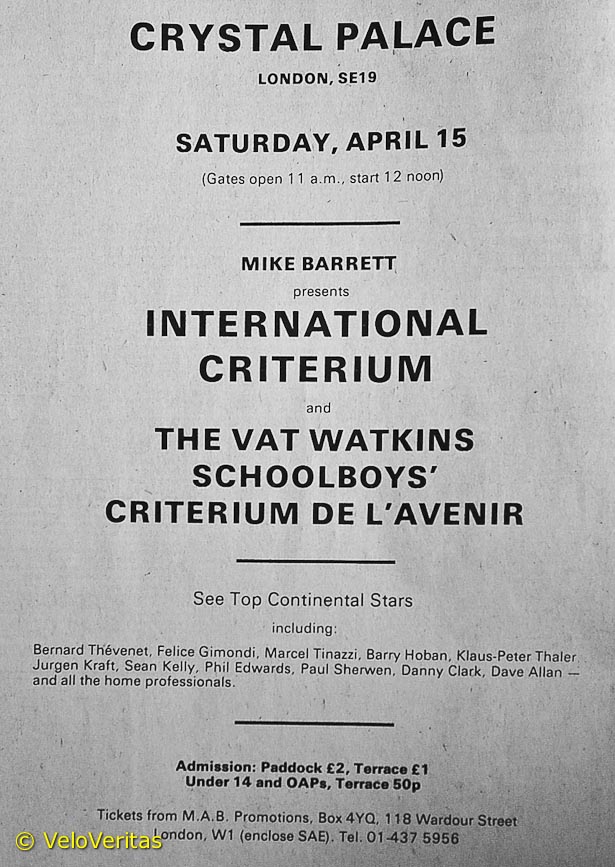
‘The Crystal Palace Grand Prix’ was run in April 1978 on the famous circuit of that name in London, where you can still go and ride the mid-week ‘crit.’
I have it in my mind that the race was actually better known as the ‘Gimondi Meet,’ with the ageing Campionissimo still looking the absolute epitome of cool on his celeste Bianchi for a reported contract fee of £1,500 – big bucks in 1978.
But a world away from the minimum €50,000 Lance would command at the peak of his fame.
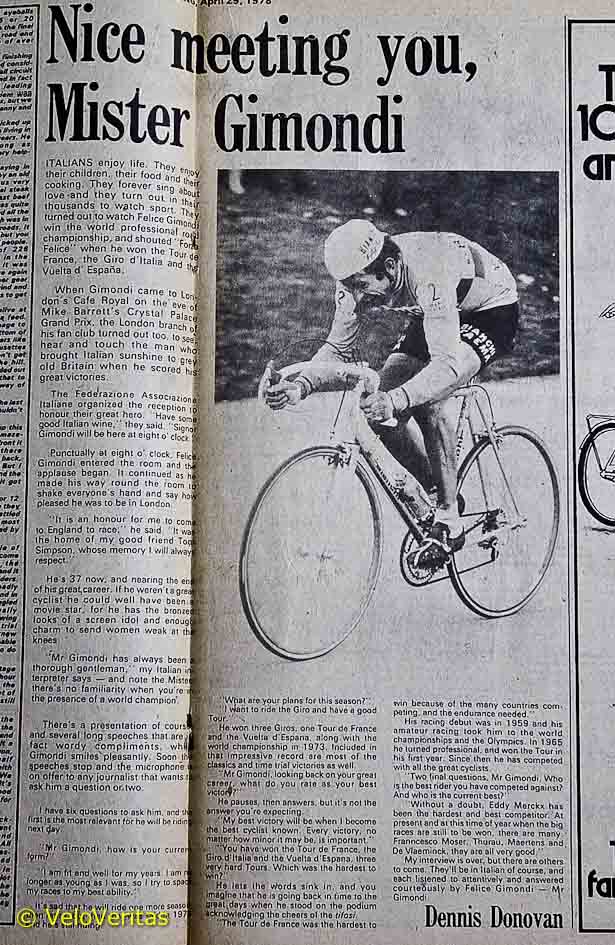
We’d been down the year before to the ‘Merckx Meet’ at Eastway and seen Dietrich Thurau slip away to win from Sid Barras who out-sprinted Eddy Merckx to take second.
My abiding memories of that race are the guy in the pilchard suit who had to do a lap of honour waving from the roof rack of the lead car – the race being sponsored by Glenryck Pilchards.
And Phil Bayton doing his contorted face ‘Staffordshire Engine’ thing from the gun; whilst ‘Big Ted’ was riding in the bunch hands off, adjusting his Oppy cap oblivious to the fact that Phil was bursting a gut to explode the race.
But I digress; both the Merckx and Gimondi meets were promoted by famous boxing empresario, the late Mike Barrett who thought that he could ‘break’ professional bike racing mainstream in the UK.
He never quite pulled it off but his efforts were to be commended and we were more than happy to thrash our hired Cortina to London to see the riders he’d contracted; who we could only usually read about in the Cycling Weekly.
As you might expect on a flat circuit with most of the top continentals flying back to race in Europe the next day, it wasn’t the most exciting of races.
But all the names got to show at the front, including double Tour de France winner, Bernard Thevenet – also reputed to be on £1,500 start money.
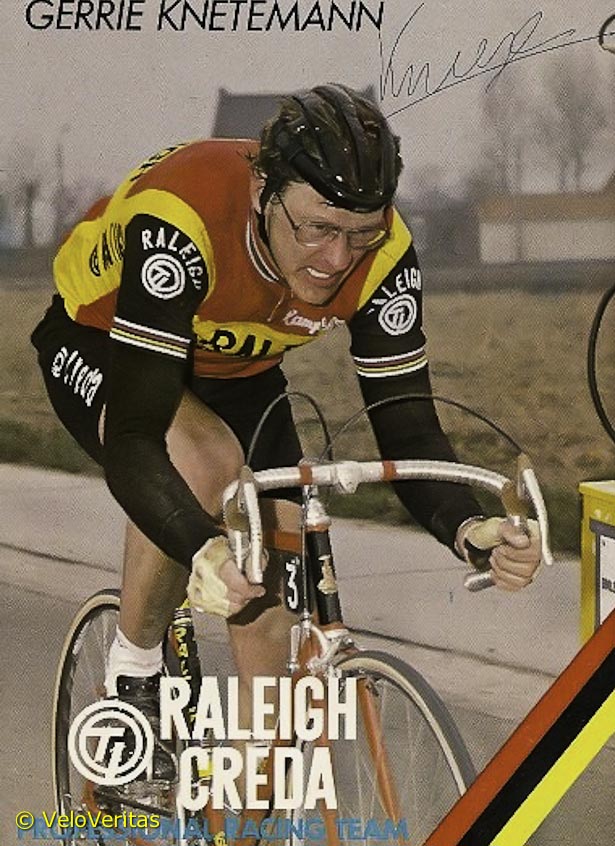
Raleigh star, the late Gerrie Knetemann slipped off the front in the closing laps with Viking’s home pro, the also late, Paul Carbutt in his back pocket.
Carbutt sat on for the duration but was still no match for the Dutchman in the finale; but no shame to the Englishman – Knetemann would end the season in the rainbow jersey of world champion.
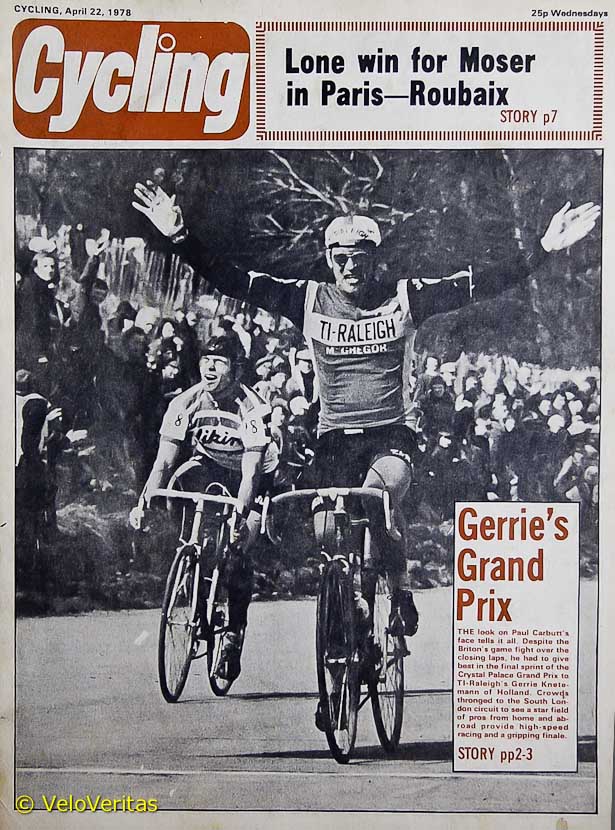
‘De Kneet’ was a pro from 1974 until 1989 with Gan, Raleigh, Boule d’Or and PDM.
A measure of his talent is that he won the Amstel Gold in his first pro season.
As well as a fine one day rider with wins in the Worlds, GP Frankfurt and Pino Cerami, he won the Tours of Holland, Sweden and the Mediterranean as well as stages in the Tour de France where he wore the maillot jaune.
He was also an excellent Six Day man and sponsor’s dream, always joking and coming out with the quotable quotes; some references sources quote 127 wins for him but I have seen it as high as 155.
He died of a heart attack whilst on his bike at just 53 years-of-age; sobering if you’re going on 58 like I am.
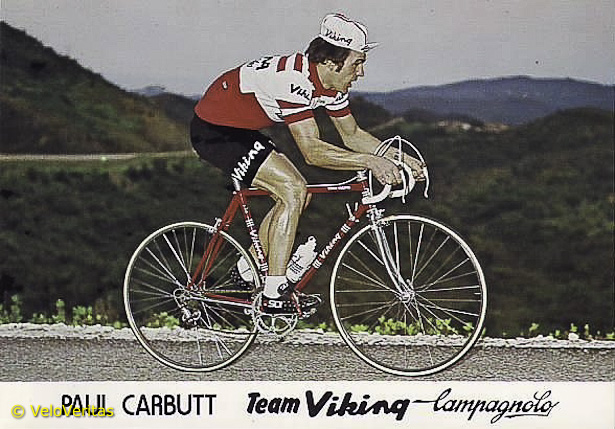
Sadly, Paul Carbutt passed away at the same age – 53, in May 2004 having succumbed to motor neurone disease.
Carbutt enjoyed a fine amateur career; he was on the podium of the Archer GP and Manx International – neither race is still run but both were great events – and also the British Road Race Championship.
He won the Girvan Three day – another race consigned to the history books – and was an excellent time trial rider with wins in the RTTC 50 and 100 mile championships as well as the 12 hour.
But he also made the podium of the British Hill Climb Championship and broke the Lands End to John O’Groats record with 1:23:23.
He took that record in the colours of Viking – with some saying that the ride took so much out of him that he was never the same rider, again.
He was pro from 1978 to 1982, riding for Harry Quinn and Itera after his tenure at Viking.
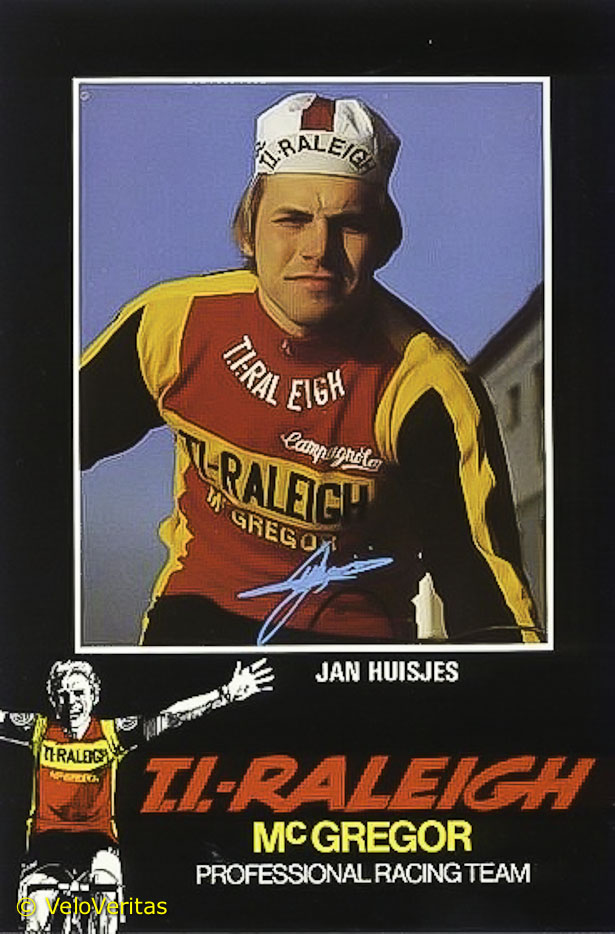
The bunch sprint was won by Jan Huisjes (TI-Raleigh-McGregor) – to give the team its full title – two out of three on the podium.
Thankfully, Huisjes is still around; he’s 62 now and enjoyed only one season under Peter Post’s guidance.
A talented amateur, he rode for Dutch criterium team Marvik Benco in 1977, winning national track titles in the sprint and scratch as well as a stage in the Tour de Picardie.
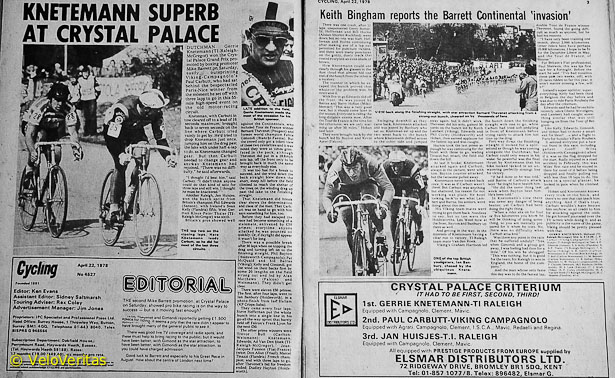
Just behind him was a man who exuded cool, but having moved to Italy when his racing days were over, has been neglected when we look back at top GB riders from the 70’s – Phil Edwards.
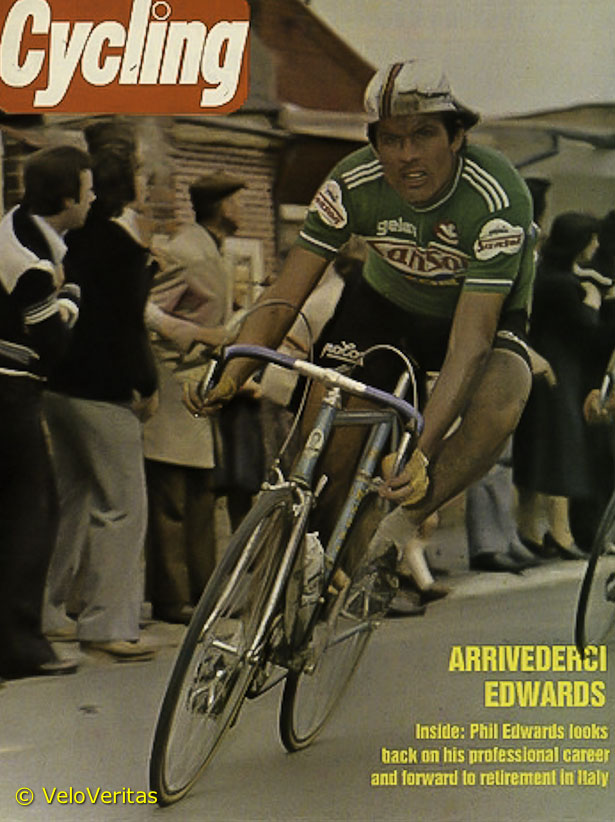
Big, strong and with dark Mediterranean good looks inherited from his Italian mother, Edwards was quality.
He could go to The Netherlands and win races and finished top six in the Munich Olympics road race.
He was one of the brightest lights on the UK amateur road scene in my youth, winning the prologue and a stage in the ’75 Milk Race.
But when he started winning Italian amateur classics, his fate was sealed and he signed on the dotted line for Italian ice cream company Sanson’s squadra at the end of season 1976, remaining with them until 1980.
He was British pro champion in 1977 and whilst his main job was to be Francesco Moser’s wingman, he picked up podiums along the way in races like the Tre Valli Varesine and Giro dell’Emilia.
And as if being cool, tall and handsome and riding for Sanson wasn’t enough – he married one of those beautiful Italian TV girls.
Some boys . . .
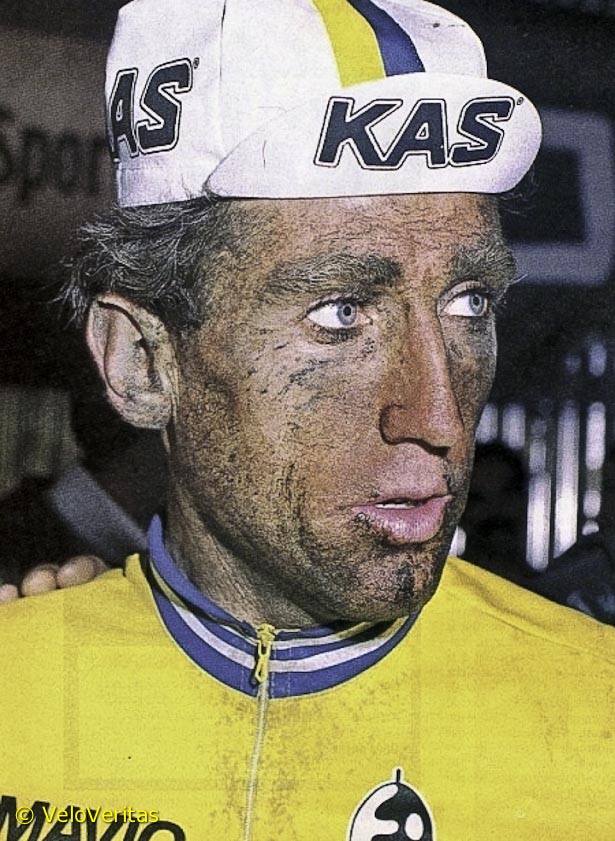
Edwards just got the better of a certain Sean Kelly, riding for Flandria at that stage – he’d also carry the colours of Splendor, Wickes, Sem, Skil, Kas, PDM, Lotus, Festina and Catavana during a career which lasted from 1977 until 1994.
The win which made the pro teams prick up their ears was his 1976 victory in the Piccolo Giro di Lombardia.
In his first pro year he won stages in the Tour of Romandie and Etoile des Espoirs as well as the GP Lugano and Circuit de l’Indre.
Not so long after Crystal Palace he’d win his first Tour de France stage.
He’d win virtually every stage race in Europe and Iberia – with the exception of le Tour but including the Vuelta.
While the Giro was never really on the agenda of the teams he rode for during his ‘Golden Years.’
And that’s before we talk about Classics; Milan-Sanremo, Gent-Wevelgem, Paris-Roubaix, Liege-Bastogne-Liege, Paris-Tours, the GP des Nations and the Tour of Lombardy all went his way at least once.
My favourite palmarès site lists 33 wins in 1984 and 31 in 1986 – remarkable.
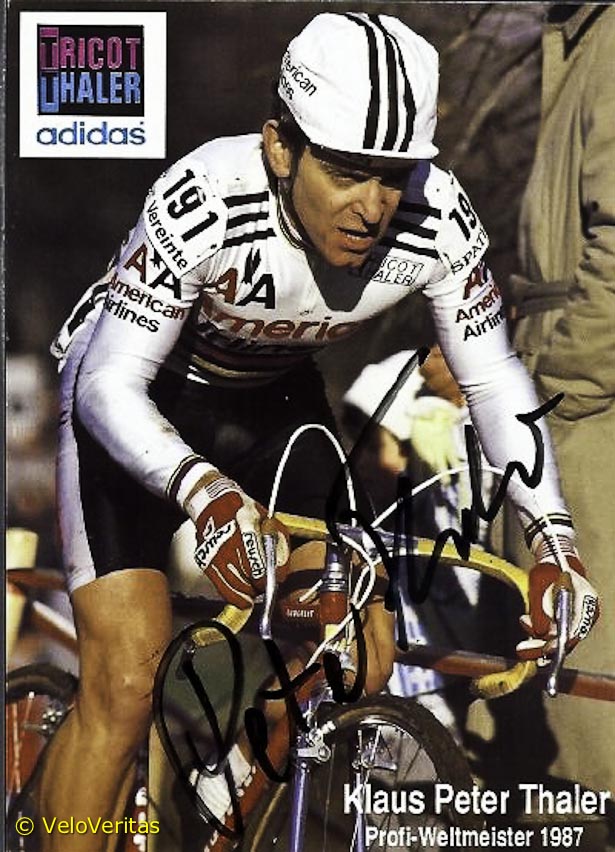
In sixth spot was yet another Raleigh man – the men in red, black and yellow knew they had to put on a show in the sponsor’s home country – Klaus Peter Thaler; a man who could win Tour and Vuelta stages but was a amateur and professional champion of the world in cyclo-cross.
The German rode from 1977 through to 1988 for Teka, Raleigh, Puch and Maredo.
That was the top six but we also thought we’d pick a few names at random from the other finishers.
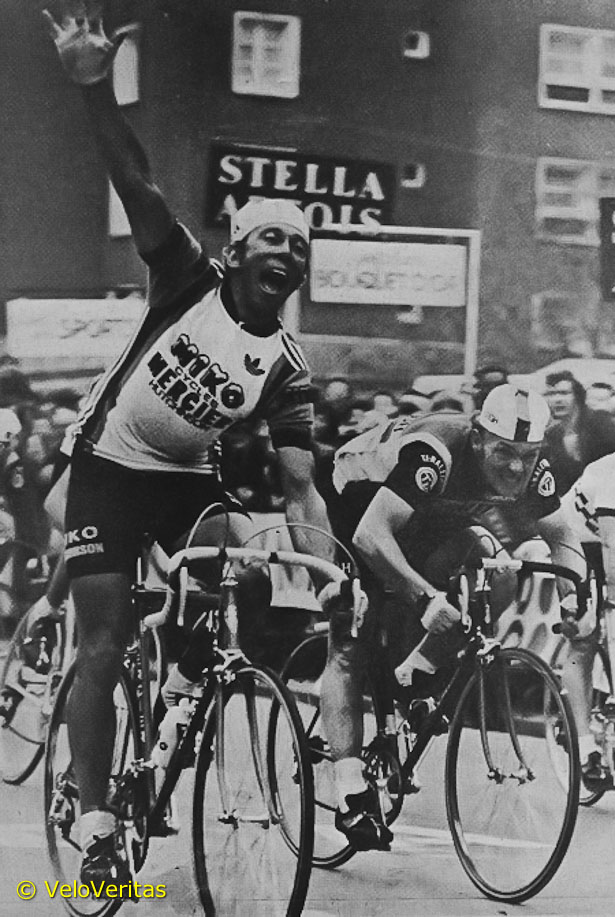
In 12th spot was Mr Barry Hoban, riding for Miko at that time of his career – he also rode for Bertin, Mercier, Sonolor and Gan.
He ended his long career – 1962 to 1981 – racing in the UK for Falcon and Coventry Eagle.
By ’78 he was past his peak but still picked up a stage in the Dunkirk Four Day – to add to eight Tour de France stages, Vuelta stages, Paris-Bourges and Gent-Wevelgem.
And in 15th place was a young man who if he was around with the Sky regime in 2013 would be a world beater – Ian Banbury (Holdsworth).
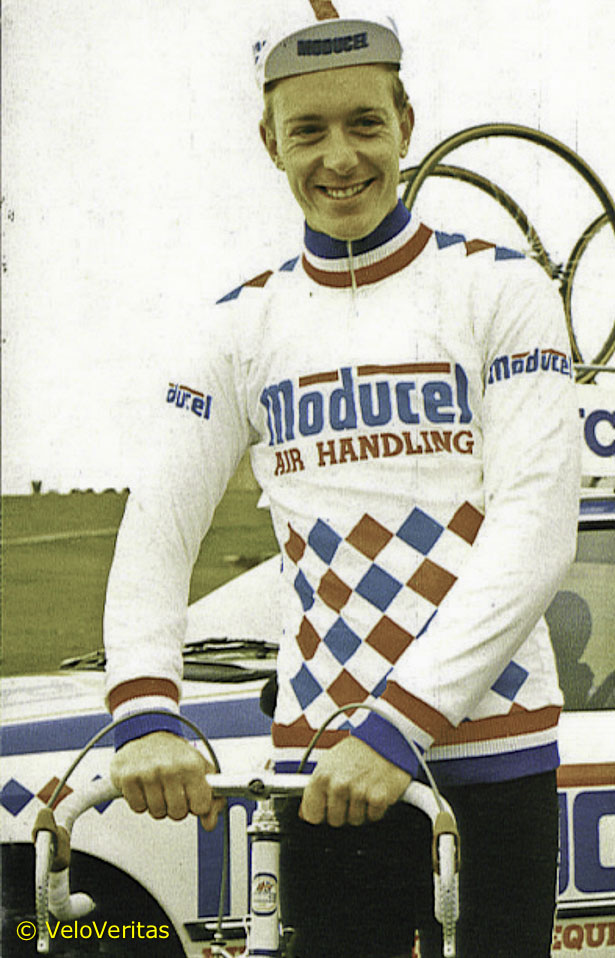
Banbury was an Olympic team pursuit bronze medallist in the 1976 Montreal Games whilst still in his teens, after a stellar junior career.
He turned pro in 1978 and would ride for Holdsworth, Falcon, Viking, Coventry Eagle, Moores and Moducel in a career which lasted until 1986 and included a British pro road race title.
The word was that Banbury was never going to suffer from being over-trained but despite that he won a lot of races on the UK scene.
And to give an indication of his talent he beat the likes of former world amateur road race champion Ad Gevers and prolific pro winner Cees Priem to win the prologue in the 1978 Kellogg’s Tour.
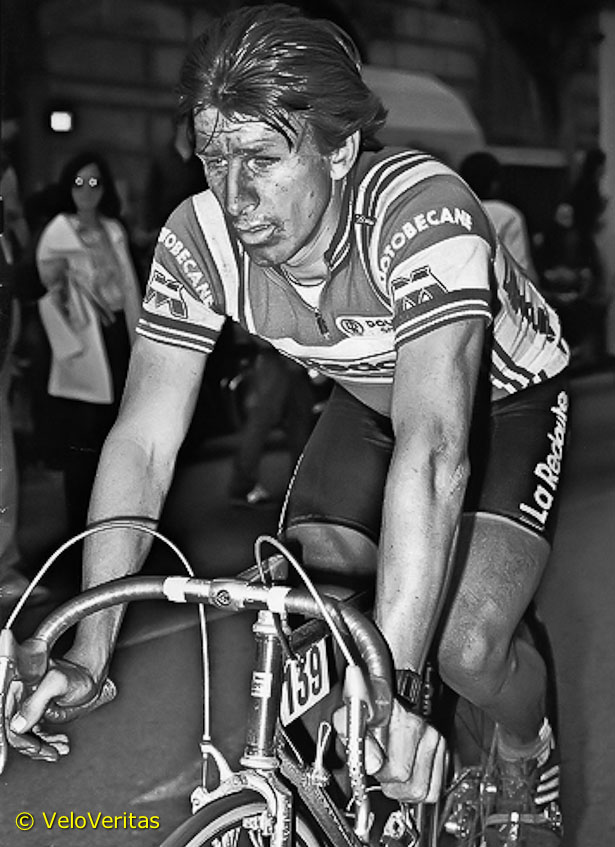
‘Well Phil,’ is his catch phrase and he’s taught us all the pro road racing is a ‘poker game’ – yes, Paul Sherwen, commentator extraordinaire was in there in 38th spot.
But joking apart, Sherwen was a solid professional and in a career which lasted from 1978 to 1987 he rode for Fiat, La Redoute and Raleigh.
Along the way there were seven Tour de France starts and stage wins in the Tour of the Mediterranean and Quatre Jours de Dunkerque as well as the GP Denain, Tour du Hainault Occidentale and a British pro road race title.
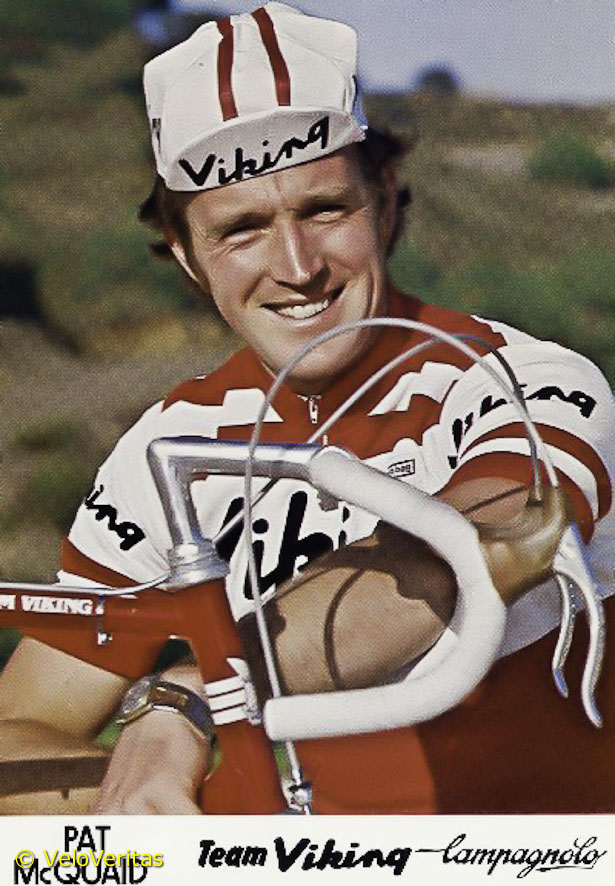
And at a time when the mop isn’t flopping his way, we thought we’d give a certain Mr. Patrick McQuaid a mention – things were simpler for him, back then.
Many folks don’t realise that Old Pat was a pro and not a bad rider at that, he got round Crystal Palace in 24th spot but was never a crit rider.
He won the hotly contested Shay Elliott Memorial race in 1972; two stages in the Ras and the Irish Championships in 1974; the Tour of Ireland in ’75 and ’76 and the Tour of the Cotswolds (another one in the history books) the same year and in 1978 as a Viking pro, the Tour of the Pennines.
He was with Viking again in ’79 where his pro career ended – and talking of Pat’s career ending…
So, when you find that 1976 Inverness-Elgin progie in an old JD Whisker musette at the back of the garage, you know what to do!



